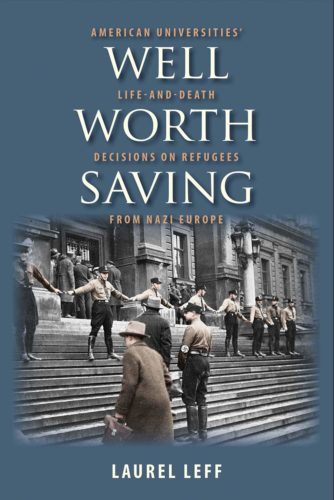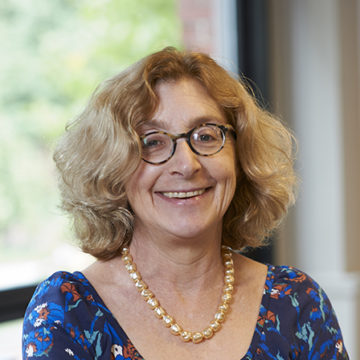Book Review: Refugee Scholars — “Well Worth Saving”
By Helen Epstein
This is a carefully researched book of far more than academic interest.
Well Worth Saving: American Universities’ Life-and-Death Decisions on Refugees from Nazi Europe by Laurel Leff. Yale University Press. 368 pp.
 Finding a position in American higher education has rarely been a cakewalk, as so many academics and grad students in New England know. One of the most difficult times was during the Great Depression. Between 1930 and 1933, more than 2000 American professors — almost 10 percent of all academics — lost their jobs. Budgets were cut, salaries took a hit, new hiring froze. And just then, a wave of scholars desperate to get out of Nazi-dominated Europe swelled.
Finding a position in American higher education has rarely been a cakewalk, as so many academics and grad students in New England know. One of the most difficult times was during the Great Depression. Between 1930 and 1933, more than 2000 American professors — almost 10 percent of all academics — lost their jobs. Budgets were cut, salaries took a hit, new hiring froze. And just then, a wave of scholars desperate to get out of Nazi-dominated Europe swelled.
In January of 1933, Adolf Hitler became chancellor of Germany. Prescient anti-Nazi artists and intellectuals had already been trying to emigrate. Then, three months later, Jews were summarily dismissed from the civil service and, because German universities were state-run, about 1200 Jewish academics were fired. As Nazi racial laws reached into Austria, Czechoslovakia, Poland, France, and Italy, the numbers of Jewish and non-Jewish would-be emigrants trying to find new jobs at universities on every continent snowballed.
Those who pursued appointments in the United States discovered an immigration system designed to keep America white and ethnically homogeneous. As per the Immigration Act of 1924, yearly quotas based on the U.S. census of 1890 determined that only 2 percent of the number of all nationals of countries represented in the U.S. that year could enter America. That meant 25,957 people per year from Germany — a fraction of the number of people who needed to get out.
Close relatives of American citizens could circumvent the system and enter on a non-quota visa — and so, potentially, could a limited number of scholars. “The key provision was Section 4(d) of the Immigration Act of 1924,” writes author Laurel Leff, an associate professor of journalism at Northeastern University. “It provided a non-quota visa to an immigrant who continuously for at least two years immediately preceding the application for admission to the United States has been, and who seeks to enter the United States solely for the purpose of carrying on the vocation of minister of any religious denomination, or professor of a college, academy, seminary or university; and his wife and his unmarried children under 18.”
It is Leff’s intent in her closely researched and absorbing book to reexamine the hallowed and largely uncontested American rescue narrative of the 1930s and early 1940s. That narrative informs hundreds of biographies and autobiographies of the many European doctors, lawyers, research scientists, and other academics who left Europe and were able to successfully continue their careers in the U.S. — many at Boston area colleges and universities. In these many narratives by and about Einstein, Fermi, Arendt, Marcuse, the Mann family, Brecht, Werfel, and (Alma) Mahler, little attention is usually paid to the considerable obstacles encountered by their protagonists — especially the bureaucratic and often anti-Semitic obstacles.
In Well Worth Saving, Leff does exactly that. Instead of recounting the triumphant story of what Europe lost and America gained by saving intellectuals and scientists from the Nazis, she looks at what happened to eight less famous men and women who were not deemed “worth saving” enough. They include Hedwig Kohn, a Breslau University physicist; Mieczyslaw Koliniski, a Berlin-based musicologist and anthropologist who fled to Belgium, where he worked in hiding during the German occupation, ultimately teaching at the University of Toronto; another is Kathe Spiegel, a Prague archivist and medieval historian who was deported and murdered by the Nazis. Drawing on private correspondence and institutional records, Leff scrutinizes the people who made that determination, and the criteria they used.
To qualify for the non-quota visa, European scholars were required to prove that they had been teaching in their home country and that a teaching job was awaiting them in the U.S. While then — as today — many tried to leverage prior visits and personal and professional networks, the process was usually too difficult to navigate alone or through personal friends. Two new organizations, supplemented by other, older ones, sprang into action.
The first was the Emergency Rescue Committee in Aid of Displaced German Scholars, established in May 1933, when three Jewish professionals, alarmed by what they were hearing from Europe, contacted the head of an international student exchange program in New York. Stephen Duggan assigned his assistant, then an unknown young Quaker named Edward R. Murrow, to supervise “a cautious program of cultivation and persuasion” to locate potential positions for refugee scholars and to raise money to help fund them. The Committee spent $800,000 from 1934 to 1945, received over 6,000 appeals, and placed 335 scholars.

Author and journalist Laurel Leff. Photo: Northeastern University.
The second was New York City’s New School for Social Research. which eventually hired 180 scholars from Europe. Founded in 1919 by progressive educators, it was directed by Alvin Johnson, an economist whose international research had made him aware of the Nazi danger. By 1933, he had raised money to fund the University in Exile and subsequently hired an all-refugee faculty to teach in what became the graduate Faculty of Political and Social Science. Other institutions that hired more than a handful of refugees were the newly established Institute for Advanced Study located in Princeton, New Jersey, though it was not affiliated with the university; arts-oriented Black Mountain College in Asheville, North Carolina; and historically black colleges that were in need of faculty. A few established organizations, including The Rockefeller Foundation, the American Friends Service Committee, and the American Association of University Women, also expanded their mandates and stepped in to help fund these professorships.
Leff analyzes and quotes from internal organizational memos. While a few provide a gleam of humanity, the correspondence mostly paints a discouraging picture of the narrow-mindedness and callousness of American university administrators and officials at the U.S. State Department at a time of mounting crisis. In light of immigrant issues today — and, of course, knowing what happened to the scholars who remained in Europe — the gentlemen exchanging letters about overseas scholars sound like Goldilocks dissatisfied with her choices of gruel. Prospective hires from Europe were supposed to be not too young, not too old, not too right-wing, not too left-wing, and not female. Some administrators specifically asked for Aryans or Protestants or men who appeared Nordic. Many colleges and universities referenced a “one-Jew rule” for their departments. Some asked or described without being asked “how Jewish” a candidate looked or sounded or behaved. With all this going on in addition to the usual hiring issues of turf and ego, it’s a wonder they hired as many refugees as they did.
Murrow, of course, was onto this right away, and I wondered how much of his American experience would later inform his war reporting from Europe. Murrow visited many universities personally and found “a general indifference and a smug complacency in the face of what has happened in Germany… a tendency to consider the matter as a Jewish problem and a failure to realize that it represents a threat to academic freedom in this country as well as in Europe. Part of this attitude undoubtedly has its roots in a latent anti-Semitism which in my judgment is increasing very rapidly.”
This is an ambitious study that was probably not easy to document, organize, write, or live with. I salute Leff for addressing this unwritten history with such a devastating book.
Helen Epstein is the author of ten books of non-fiction and editor of the forthcoming Franci’s War (Penguin 2020). She has reviewed for The Arts Fuse since its inception.
